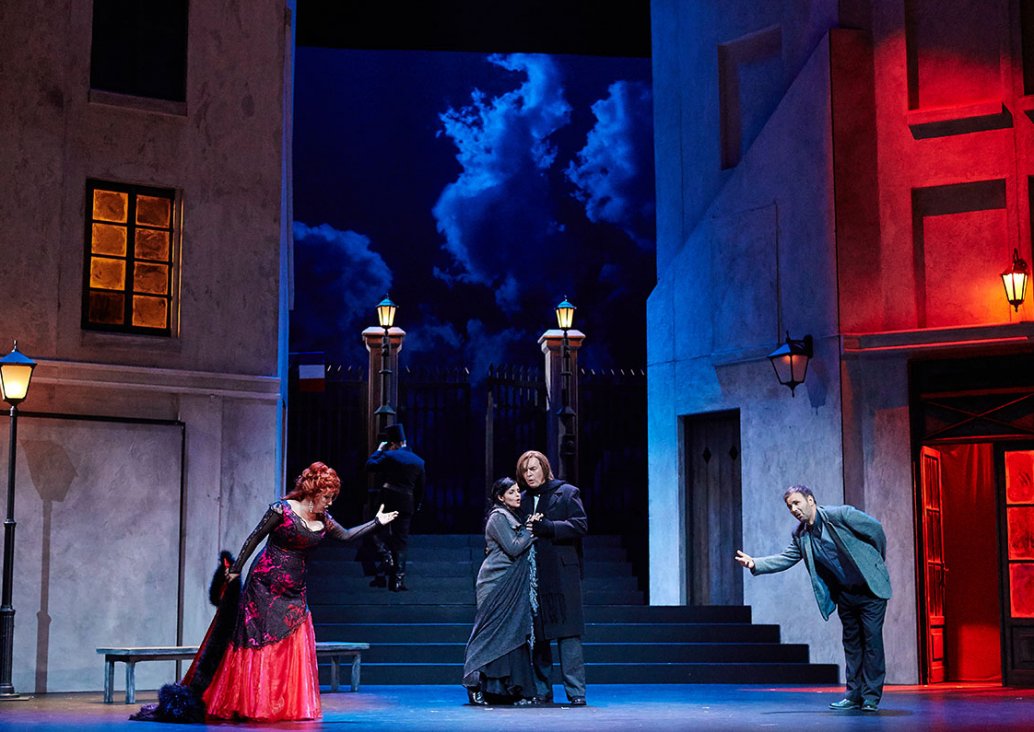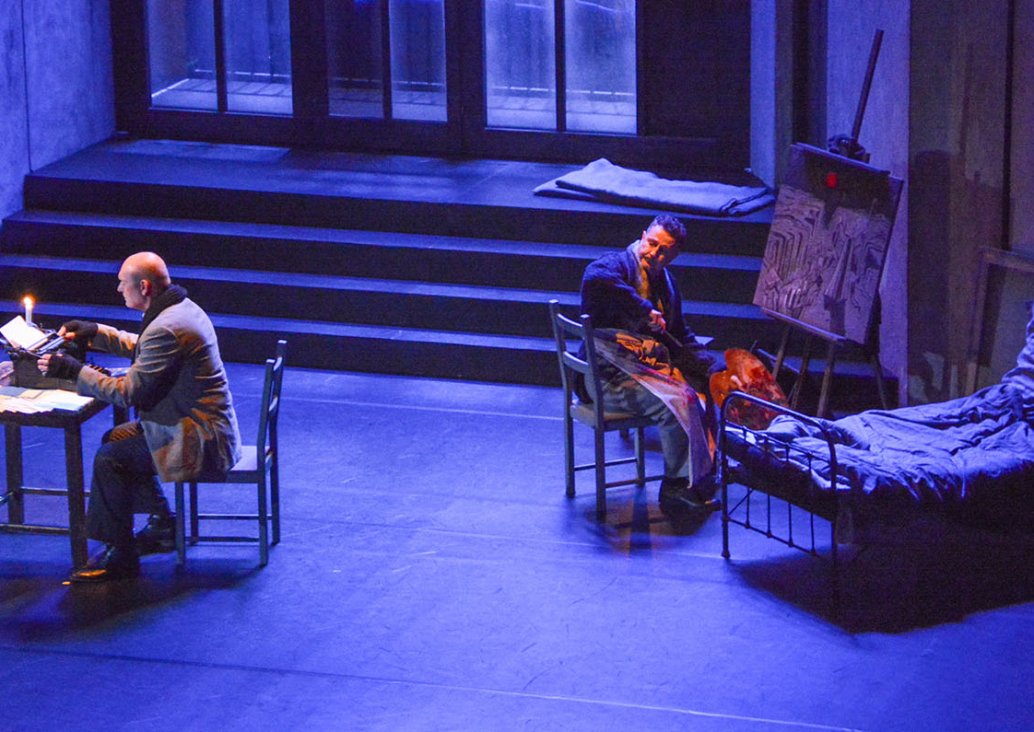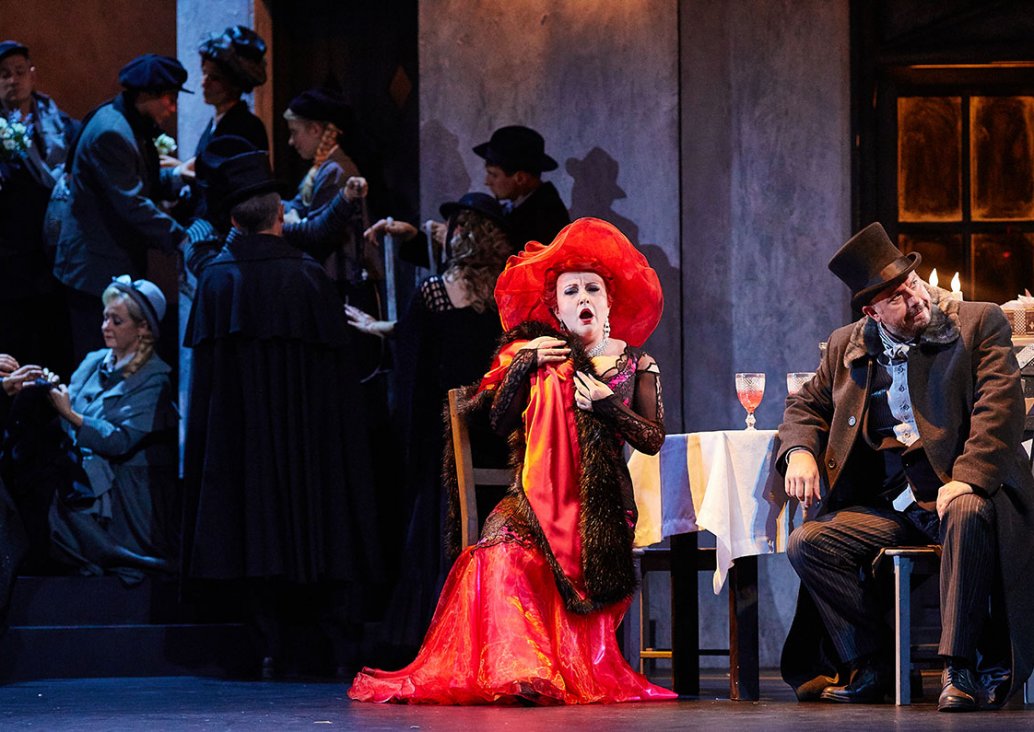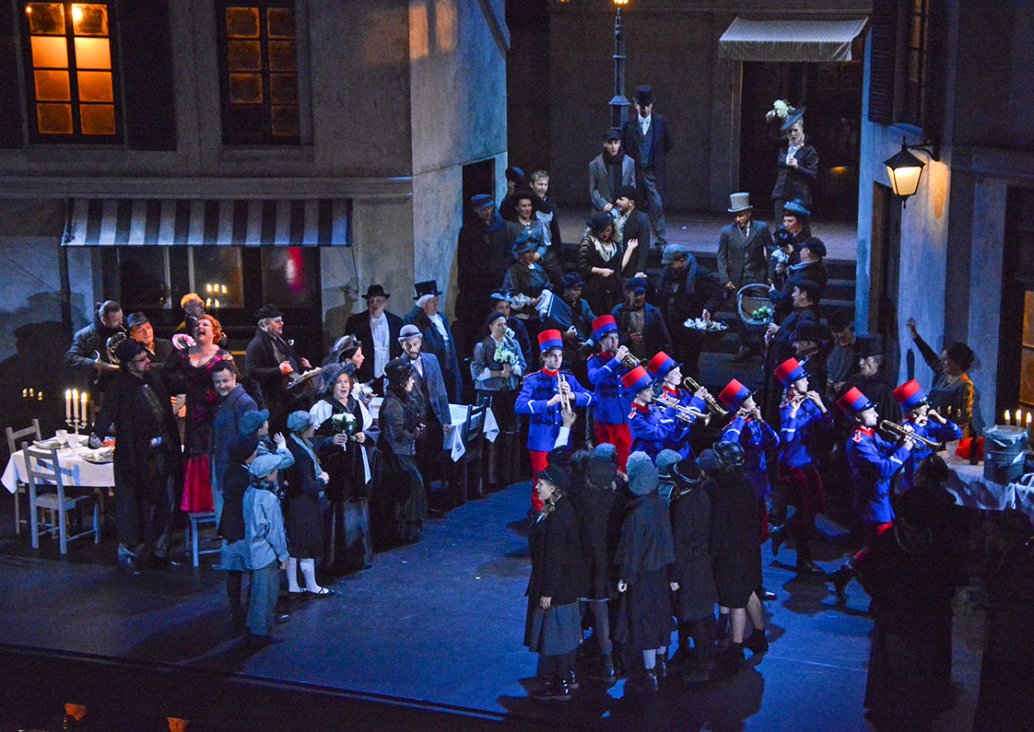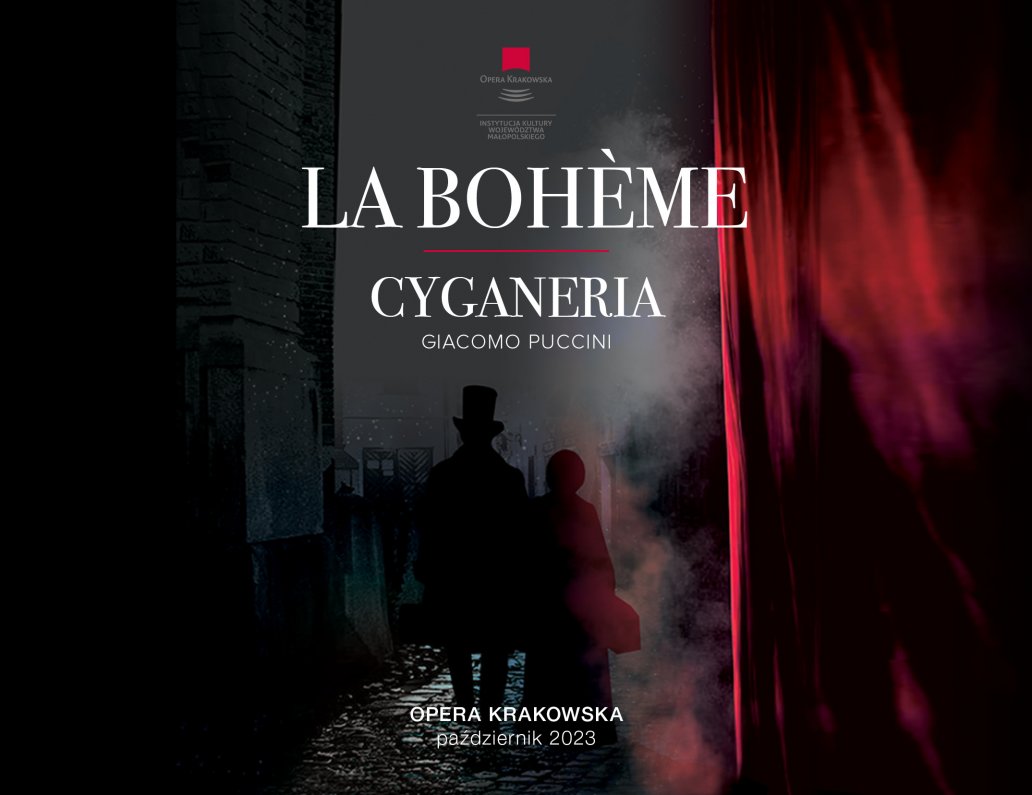
Opera
La Bohème
Lyrical scenes in four images (acts)
Giacomo Puccini
Laco Adamik
Tomasz Tokarczyk
Tomasz Tokarczyk
2
hours
50
minutes
details
information
duration
2
hours
50
minutes
|
2
intermissions
composer
Giacomo Puccini
libretto
Luigi Illica and Giuseppe Giacosa, based on Henri Murger’s novel “Scènes de la vie de bohème”
World premiere
Turin, Teatro Regio, 1 February 1896
Polish premiere
Warsaw 1898
premiere at the Krakow Opera
25 September 2015
language
Sung in the original Italian, with Polish subtitles
description
‘...freshness, youth, passion, cheerfulness, tears shed in silence, a love that gives you joy and makes you suffer,’ Puccini wrote about the perfect theme for an opera which he had found in Murger’s novel Scènes de la vie de bohème, which he himself could relate to through his own experience of several years spent as a student and artist at Milan’s conservatory. The duo of Giacosa and Illica magically turned the material into a superb libretto, not without some intervention of the composer himself. The latter endowed the tale of the Parisian bohemian life with a melodious phrase congenial with the situation, proving himself a master in building up the mood, inciting yearnings, and moving the audience. The residents of a poor garret are about to abandon their artsy spaces and walk into a life ruled by different laws. For now, however, they are experiencing their first loves, and the first complications that come with them, as well as the first misfortunes in their lives, including death, which forebodes the end of their beautiful amusements, the end of carefree times, and thus a goodbye to youth. But let us not ponder on this yet, let us forget all about it and let ourselves be overtaken by the joyful mood of Musetta’s waltz, or the enticing words of the main heroine, ‘Si, mi chiamano Mimi’(‘Yes, they call me Mimi’) and Rodolfo’s bold attempt at seduction, ‘Che gelida manina’ (‘What a cold hand’). We’ll be better off that way.
Poster
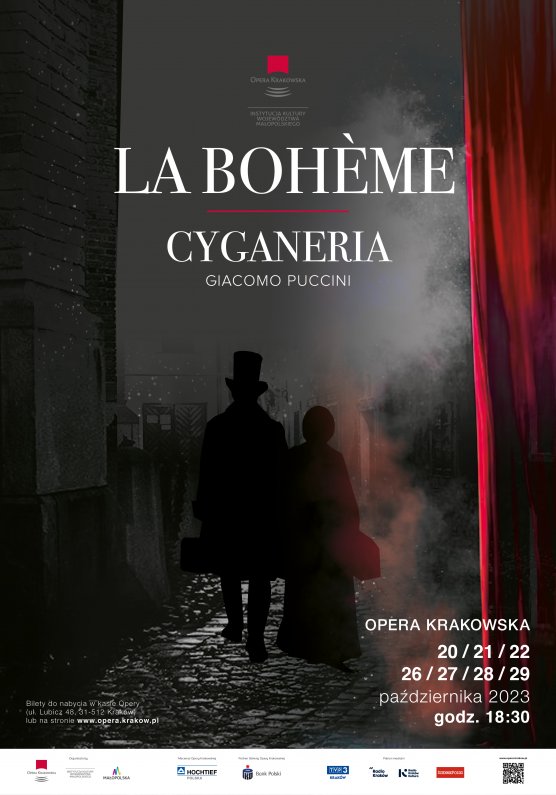
poster by
Marzena Mysłek
producers and cast
producers
Director: Laco Adamik
Conductor: José Maria Florêncio
Music Director: Tomasz Tokarczyk
Set and Costume Designer: Barbara Kędzierska
Lighting designer: Bogumił Palewicz
Conductor: José Maria Florêncio
Music Director: Tomasz Tokarczyk
Set and Costume Designer: Barbara Kędzierska
Lighting designer: Bogumił Palewicz
cast
RODOLFO | Piotr Buszewski, Tomasz Kuk, Andrzej Lampert, Adam Sobierajski
MIMI | Adriana Ferfecka, Paula Maciołek, Iwona Socha
MARCELLO | Szymon Komasa, Adam Szerszeń
MUSETTA | Zuzanna Caban, Aleksandra Orłowska, Katarzyna Oleś-Blacha
SCHAUNARD | Michał Kutnik, Tomasz Rudnicki
COLLINE | Sebastian Marszałowicz, Wołodymyr Pańkiw
BENOIT | Jacek Ozimkowski
ALCINDORO | Sebastian Marszałowicz, Wołodymyr Pańkiw
PARPIGNOL | Janusz Dębowski
and
Stanisław Knapik, Dariusz Palonek, Łukasz Lejek, Jarosław Dijuk
CHOIR, CHILDREN'S CHOIR and ORCHESTRA of the Krakow Opera
Conductor: José Maria Florêncio
MIMI | Adriana Ferfecka, Paula Maciołek, Iwona Socha
MARCELLO | Szymon Komasa, Adam Szerszeń
MUSETTA | Zuzanna Caban, Aleksandra Orłowska, Katarzyna Oleś-Blacha
SCHAUNARD | Michał Kutnik, Tomasz Rudnicki
COLLINE | Sebastian Marszałowicz, Wołodymyr Pańkiw
BENOIT | Jacek Ozimkowski
ALCINDORO | Sebastian Marszałowicz, Wołodymyr Pańkiw
PARPIGNOL | Janusz Dębowski
and
Stanisław Knapik, Dariusz Palonek, Łukasz Lejek, Jarosław Dijuk
CHOIR, CHILDREN'S CHOIR and ORCHESTRA of the Krakow Opera
Conductor: José Maria Florêncio
ticket
200 zł
170 zł
150 zł
120 zł
100 zł
90 zł
synopsis
ACT I
A garret overlooking the snow-covered roofs of Paris. Marcello is trying to paint The Crossing of the Red Sea and his friend Rodolfo pretends to be working on his tragedy in five acts in verse, though in actuality he is pondering on nothing in particular while staring through the window (“Questo Mar Rosso”). What’s the use of art when your teeth chatter! Unwilling to sacrifice a priceless chair, Rodolfo feeds the fireplace with his manuscript. Their friend Colline, a philosopher, comes back with bad news: the pawnshop wouldn’t take his books... Freezing cold, Colline sits down by the fireside but the poetry burns up fast and affords little heat... All of a sudden the door is thrown open and in come two shop assistants, bringing food, drinks, cigars, and firewood. The fourth friend, the musician Schaunard, has obtained a lucrative commission with an English gentleman: he was supposed to play for his parrot until the beast died. After three days of fruitless effort, Schaunard poisoned the bird and pocketed the fee. Now he’s holding back his voracious friends: on Christmas Eve you drink at home but dinner must be taken in a restaurant! They’re about to leave when a knock on the door can be heard. A fatal visit! It’s Mr Benoit, the landlord, about the overdue rent. The boys treat him to some wine and change the subject through lively conversation (“Dica, quant’ anni ha”), and when the tipsy Benoit begins to talk dirty about his own wife, they pretend to be outraged by his behaviour and throw him out. Marcello, Colline and Schaunard head for the Café Momus, leaving Rodolfo behind, toiling over an article he has to finish. His work is interrupted by another knock on the door, but this time it’s a more pleasant visit. It’s their lovely neighbour, a grisette, whose candle has gone out, and apparently she is also not feeling well. Rodolfo offers her a chair and a glass of wine; once her crisis is over and her candle rekindled, the girl sets to leave, except she seems to have misplaced her room key (“Oh! sventata! Sventata!”). A sudden gust of draught blows both candles out and though Rodolfo presently finds the key in the darkness, he is far from giving it back without getting something in return. Pretending to keep looking for it, he brushes the neighbour’s hand, apparently by accident (“Che gelida manina”), and uses this opportunity to make a formal introduction: He is a poet, a dreamer with the soul of a millionaire. She responds in a similar tone (“Mi chiamano Mimi”): Her name is Mimi, she lives alone in her room, where she makes paper flowers. For the time being, no more information is required, and when the impatient voices of the returning friends are heard from the staircase, Mimi and Rodolfo decide to walk out to greet them together, with one word on their lips: Love!
ACT II
The Latin Quarter. A Christmas crowd gathers outside the Café Momus (“Aranci, datteri!”). Marcello, Schaunard and Colline take a table on the veranda while Rodolfo buys a lovely bonnet for Mimi and introduces his new acquaintance to his friends: he’s a poet, and she’s pure poetry, so they obviously make a perfect pair. The toy vendor Parpignol comes by, exciting madness in the children and panic in the parents (“Parpignol!”). Mimi and Rodolfo’s idyllic relationship has spoiled Marcello’s mood, still brooding over a certain disrupted affair... By a strange stroke of luck, the fatal heroine of his reminiscences, Mademoiselle Musetta, appears in the café, dragging her elderly suitor, Alcindoro, behind her like a little pet dog. A dog, or perhaps a camel, as the old man is burdened with the gifts he has purchased for her in his enchantment with his goddess. Having spotted Marcello, Musetta picks the next table and, pretending not to notice him, deploys her whole arsenal of provoking poses, singing a sensual waltz (“Quando me’n vo”). Marcello gnashes his teeth in silence while Mimi instantly recognizes that these two are in love. At a loss what else to do to get the attention of the indifferent lover, Musetta pretends that she’s hurting from a tight shoe and sends Alcindoro to get a new pair. As soon as the old bore is gone round the corner, the treacherous siren falls into Marcello’s arms. The whole company use the passing military parade to mingle with the crowd and leave the bill to be paid by the desperate Alcindoro.
ACT III
In the morning, at the toll gate on the outskirts of Paris known as the Gate of Hell, the city guards let through the morning groups of dustmen, milkmen and villagers on their way to the market. Musetta’s singing can be heard from a cabaret where Marcello is doing a painting job. There is also Mimi, looking for Marcello. The painter is surprised to see her and tells her that Rodolfo is here as well. Hearing his name, Mimi bursts into tears: unable to bear her lover’s brutal jealousy, she ran away from their love nest last night. Startled by the sight of Rodolfo, Mimi hides, and consequently hears him complaining about her infidelity to his friend (“Mimi è una civetta”); when, however, Marcello’s reaction is disbelief, Rodolfo reveals the truth: Mimi’s health is getting worse by day, and he can’t bear the thought of losing her. What’s more, he blames himself for the whole situation as he’s been unable to provide for her properly. Her outburst of sobs and coughing betray Mimi’s presence while Musetta’s joyful laughter heard from the cabaret throws Marcello into a fit of jealousy and makes him dash in to fight for what he deems rightfully his, leaving the star-crossed lovers alone. Mimi has decided to move back into her lonely little room (“D’onde lieta usci”) but Rodolfo persuades her to stay with him till the spring. As Mimi and Rodolfo exchange their words of affection, Musetta and Marcello start a fierce quarrel (quartet: “Dunque è proprio finita”).
ACT IV
Back at the garret from Act I. Marcello has again broken up with Musetta, whom Rodolfo has just seen in the city, riding in a fine carriage. Marcello tells his friend that he has caught a glimpse of Mimi in the street. How are they supposed to work when they are haunted by such memories (“O Mimi, tu più non torni”)?! Schaunard and Colline bring in a royal feast: bread and herring. To cheat their hunger and aching hearts, the boys start a party, dancing and singing – but the painful truth keeps gnawing at their conscience, and then someone knocks on the door. It’s Musetta, who has left Mimi downstairs as the poor thing was unable to climb to the top floor. She found her in the street, exhausted and half conscious. Mimi has abandoned a viscount who supported her and all she wants now is just to die in Rodolfo’s arms. Her hands are so cold that her most immediate desire is to have a muff. Musetta hands her earrings to Marcello to fetch a doctor while Colline has a genius idea: he will pawn his old overcoat to be able to give Mimi the present of her dreams (“Vecchia zimarra”). Mimi and Rodolfo remain alone (“Sono andati?”). They exchange professions and sweet memories of love for the last time. Schaunard comes back at the exact moment when a sudden fit of coughing throws Mimi onto the pillows. Marcello brings the medicine and promises a doctor shortly. Musetta is back as well, with a muff in which Mimi can finally place her freezing hands and fall asleep quietly. Musetta drops to her knees and prays (“Madonna benedetta”). A sudden suspicion compels Schaunard to lean over the sleeping girl and he promptly warns Marcello: It’s all over. Colline comes back with money for Musetta. Only then, after looking into Marcello’s misty eyes, does Rodolfo understand what has just happened. He throws himself onto Mimi’s dead body with a piercing scream.
Piotr Kamiński, Tysiąc i jedna opera, PWM, 2008
reviews
Anna Kańska-Małachowska, malanart.blogspot.com, 27 September 2015
Iwona Socha was absolutely perfect as Mimi! Beautiful phrasing supported with deep dramatism of the character testify to the Artist’s great maturity in performing this role. Andrzej Lampert as Rodolfo has won over the entire audience. Already in the first act, the “Che gelida manina” aria, he established his leading position, and this does not refer only to the Krakow‘s “La Bohème”. This emotional and spontaneous singer, who demonstrates perfection in his gestures, presents a very high artistic standard. Katarzyna Oleś-Blacha did extremely well as Musetta - she surprised vocally. A slightly different-than-usual vocalising, connected with good acting skills, brought a really good result! In the role of Marcello, Adam Szerszeń added much warmth and naturalness to his character. Michał Kutnik as Schaunard displayed his excellent singing and acting skills – he created a characteristic and yet authentic figure. Colline as depicted by Volodymyr Pankiv is a winsome and genuine philosopher, whereas Andrzej Biegun, both in the role of Benoît and Alcindoro, endeared with his vis comica. In every respect, these artists, only some of whom were part of the premiere cast, form a very solid artistic basis for the Krakow version of “La Bohème”. Tomasz Kuk, as another performer of the role of Rodolfo, also deserves great appreciation. He amazed with the subtlety of sounds and emotion that made his character truly moving. The performance is a great success of the Krakow Opera. The lyrical and dramatic story of four friends and their existential problems is close to every generation and provides a timeless message. Adorned with the music of one of the greatest composers of operatic literature, it gains an appropriate character. The staging is magnificent, and not only perfectly renders the atmosphere of Paris of those days, but also outlines the silhouettes of particular characters, each of whom is strong and distinctive. This is a performance about everyone… and for everyone. I would like to congratulate the producers and thank them for yet another gem in the repertoire of our Opera.
Mateusz Borkowski, “Dziennik Polski”, 28 September 2015
Well, this title was really missing in the repertoire, so I am glad to see it back on the Krakow stage. This is not the first staging of this opera by Laco Adamik, who has initiated his career of an opera director with “La Bohème” in 1977 in the Grand Theatre in Łódź. Adamik decided to move the plot a bit forward, from the first half of the 19th century to the belle époque era, when Puccini was penning his timeless piece. This is one of the reasons why the writer Rodolfo writes his play on a typewriter, and the costumes designed by Barbara Kędzierska follow the ambient of fin de siècle (...). Out of four acts, the second one set in a café in the Latin Quarter seemed most interesting. Thanks to the dynamic crowd that hustled by the stairs, it was possible to capture the atmosphere of a bustling Paris street. The director has also skilfully incorporated a children’s choir which brought additional colour to this part of the story.
Iwona Socha was particularly convincing in her tragedy (…). Bright stars in the cast were also Mariusz Godlewski as the painter Marcello, Tomasz Rudnicki as the musician Schaunard, and Katarzyna Oleś-Blacha in the role of Musetta, who simply sparkled in the second act. With his “La Bohème”, Adamik proved his great respect for both the music and stage artists. As a result, we received a classic staging, in which the most valuable assets were the set design and costumes – coherent, since all kept in various shades of grey (…).
upcoming performances of this genre
/
